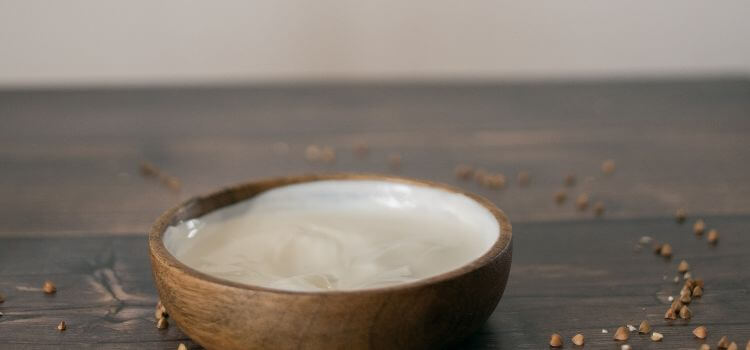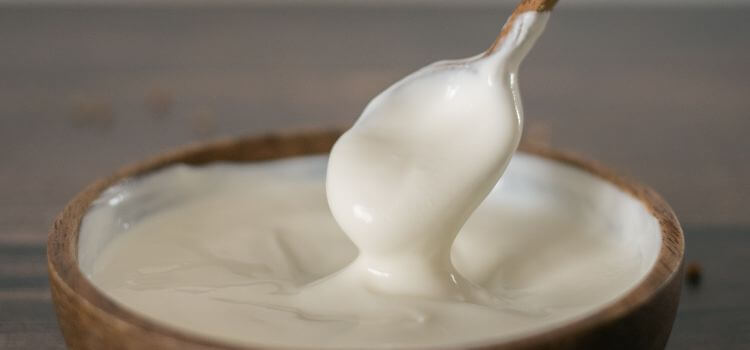As an Amazon Associate I earn from qualifying purchases.
Babies are curious little beings who are always exploring the world and enticing us with their adorable antics. As parents, we always work to provide kids with the finest diet to support their development. And as we introduce new foods, we frequently consider what is secure and suitable for their delicate palates.

Additionally, one specific query is Can Babies Have Sour Cream? We will now delve further into the subject and provide you with all the details. Continue reading to find out the information about “Can Babies Have Sour Cream” and skills that can help you make educated choices for your child’s nutritional journey.
Introduce the topic of whether it is safe for babies to consume sour cream
Adults have long used sour cream as a flavour in a number of foods. However, a lot of parents are unsure whether it’s okay for babies to eat sour cream. Can infants consume sour cream? While sour cream is generally not advised for infants under one, it can be introduced to their diet in moderation after that age.
When deciding whether to give sour cream to your child, it is important to consider the potential allergic effects and high-fat content. Before adding sour cream to your baby’s diet, like with any new food, it is best to speak with your pediatrician.
Mention the importance of providing the right foods for a baby’s nutrition
The most important thing is to provide a newborn with the correct things to eat for nutrition. As parents, it is our responsibility to ensure that our children receive the nutrients they need for healthy growth and development. In order to properly introduce new foods to babies, it’s important to consider both their dietary requirements and digestive capacity. While some foods, like sour cream, may be suitable for adults only, it is crucial to confirm whether they are safe for babies. Establishing a healthy, balanced diet for newborns can assist ensure their optimal development and general well-being. Learning which foods are appropriate for babies can help.
What is Sour Cream?
Define sour cream and explain its main ingredients.
A universal dairy ingredient, sour cream is frequently used in cooking and as a flavour. It is produced by lactic acid bacteria digesting rich cream. Cultured cream is one of the primary components of sour cream, and it is made by introducing common bacterial strains to cream and allowing it to ferment.
Sour cream gets its characteristically acidic flavor and thick, creamy texture from this fermenting process. Although sour cream is a common ingredient in many cuisines, it is important to remember that infants shouldn’t consume it until they are at least one year old since the dairy effects may be too much for their developing digestive systems to handle.
Highlight its popularity as a condiment and ingredient in various dishes.
As a flavour and ingredient in many different recipes, sour cream has greatly increased in popularity. This acidic and creamy dairy ingredient gives both sweet and savory dishes a humorous touch. Sour cream is a universal complement that enhances the flavor of every dish, from warding off a bowl of chili to enhancing the flavor of tacos.
It is a favorite among food enthusiasts due to its creamy and velvety texture and characteristic tanginess. Sour cream gives a pleasing smoothness and robust flavor to dishes whether it is used as a dip, sauce, or baking component.
Nutritional Content of Sour Cream:
Mention the vitamins and minerals present in sour cream
A great source of many vitamins and minerals that are good for general health is sour cream. It contains vitamins that are essential for a baby’s healthy maturation and growth, including vitamins A, D, E, and K. Additionally, sour cream is rich in calcium, phosphorus, and magnesium, elements that are essential for the health and strength of bones. A newborn can get these vital vitamins and minerals from sour cream, which are important for their general health.
Explain the potential benefits and drawbacks of these nutrients for babies.
Sour cream is a food that can be safely included in a baby’s diet, but it is important to understand both its potential benefits and risks. Calcium, which is essential for the development of healthy bones and teeth in infants, is abundant in sour cream.
It also contains probiotics, which can aid in maintaining a healthy digestive system. But dripping fat, which is abundant in sour cream and should be consumed in moderation, especially for young children who are at risk of obesity or heart disease, should be avoided. Before adding sour cream or any other new item to a baby’s diet, it is advisable to speak with a pediatrician to be sure it is suitable for their unique nutritional requirements.

Risks and Considerations:
Discuss the potential risks associated with introducing sour cream to babies
Adults typically like the flavoring of sour cream in a variety of foods. However, there are some hazards to take into account while giving sour cream to infants. Because of their delicate digestive systems, infants may not be able to tolerate sour cream’s high-fat content and acidity.
Digestion issues including upset stomach, diarrhea, or even food allergies could result from this. Additionally, the preservatives and chemicals in sour cream may harm a baby’s developing immune system. To ensure a baby’s safety and well-being, it is still best to speak with a pediatrician before introducing any new foods to their diet.
Age Guidelines for Having Sour Cream
Explain the recommended age for introducing sour cream to babies
Famous flavoring sour cream is used to give a variety of foods a tangy taste. However, it’s crucial to take age restrictions into account when it comes to feeding infants. Many medical professionals advise avoiding giving sour cream to infants less than 12 months. During this time, a baby’s digestive system is still developing, and sour cream’s high-fat content may make it difficult for their bodies to digest. The best course of action is still to speak with a pediatrician before introducing any new foods to your infant’s diet.
Discuss the developmental stage of babies in relation to sour cream consumption
The introduction of solid foods to babies during their developing stage is crucial for their nutrition and growth. However, it’s vital to take precautions when consuming sour cream. Due to its high-fat content and probable allergic effects, sour cream is a dairy product that could potentially be dangerous for infants.
Before adding sour cream to a baby’s diet, it is best to consult a pediatrician because babies have sensitive digestive systems. Assuring a balanced and suitable diet is key for babies’ general health and well-being during their critical developmental time.
Alternatives to Sour Cream:
Suggest alternative options that can be used as a substitute for sour cream in baby’s meals
Sour cream can be replaced in baby food with other options such as plain yogurt, mashed avocado, unsweetened applesauce, and pureed tofu. These possibilities provide newborns additional nutritional advantages in addition to a similar creamy feel.
Preparation and Serving Suggestions:
Provide tips on how to prepare sour cream for a baby’s meal.
When properly prepared, sour cream may be a pleasant addition to a baby’s meal while still being safe and suitable for their developing digestive system. Choose a premium, organic sour cream substitute that is devoid of additives and preservatives before adding it to your baby’s diet.
Incorporate little amounts of sour cream gradually into their meals to check for any potential allergic responses. Choosing full-fat sour cream is especially important since newborns require extra calories and healthy fats for growth and development. Before introducing sour cream or any other new food to your baby’s diet, don’t forget to check with your pediatrician.
Offer ideas for incorporating sour cream into baby-friendly recipes
Sour cream is a universal item that can be included in meals for babies without risk. It’s important to consider babies’ taste preferences and nutritional requirements when including sour cream in baby-friendly recipes. To produce a creamy and nutritious snack, one idea is to mix sour cream with pureed fruits like bananas or peaches.
Another choice is to combine cooked and mashed vegetables, such as sweet potatoes or carrots, with sour cream to create a creamy side dish. Sour cream can also be used to enhance the flavor and texture of homemade baby pancakes or muffins. Always seek the advice of your child’s pediatrician before introducing new foods to your infant’s diet.
Conclusion
In conclusion, The topic of whether babies can eat sour cream was covered in this blog post’s conclusion. The key issues raised were sour cream’s nutritional makeup, it’s potential for allergens, and the value of seeking medical advice..

Although sour cream is generally safe for newborns to eat while restrained, it is crucial to put their nutritional requirements first. A well-balanced diet with a range of foods is essential for a baby’s growth and development. A pediatrician or registered dietitian can offer individualized guidance and recommendations on introducing new foods to your baby’s diet during a consultation.
The choice to introduce sour cream to your baby’s food should ultimately be decided in consultation with a healthcare professional who can evaluate your baby’s particular needs and circumstances.
Amazon and the Amazon logo are trademarks of Amazon.com, Inc, or its affiliates.